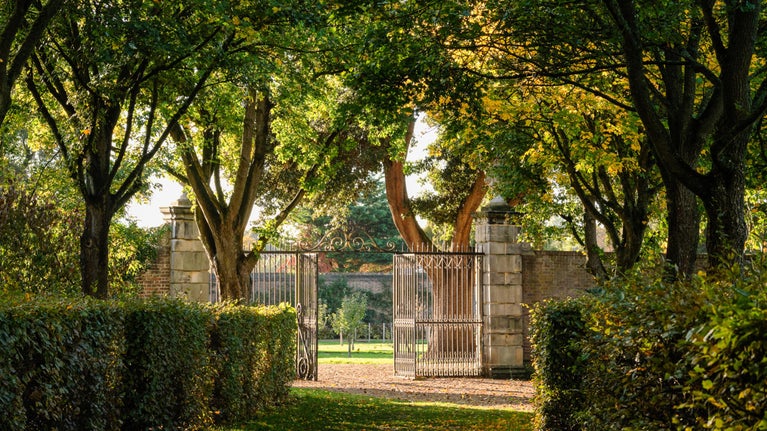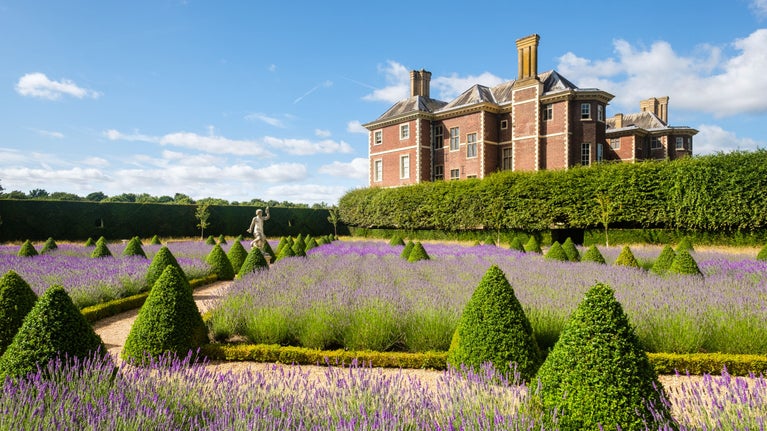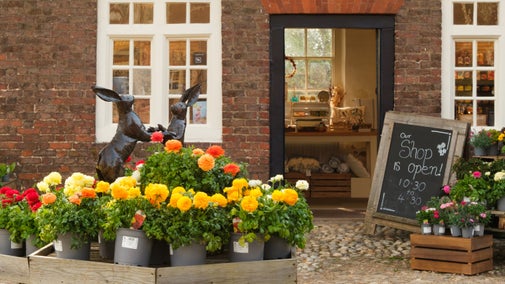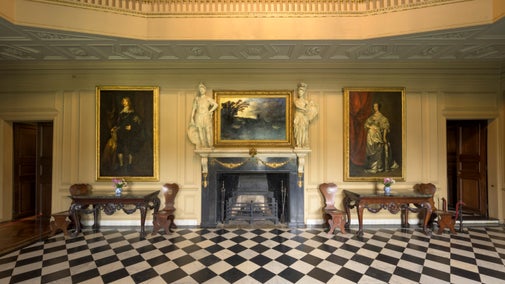
Discover more at Ham House and Garden
Find out when Ham House and Garden is open, how to get here, the things to see and do and more.

Ham House, on the River Thames in Richmond, is surrounded by spectacular outdoor spaces to explore, including an atmospheric 17th-century walled Kitchen Garden and maze-like Wilderness. The gardens show what historically ‘might have been’, following work in the 1970s to reinstate 17th-century character previously lost. Discover more about our seasonal highlights below.
Tucked behind avenues of trees, where the River Thames weaves past ancient meadows, the gardens surrounding Ham House are a tranquil spot to relax as the days grow longer and warmer.
This green oasis is only 30 minutes from central London, and offers a taste of countryside calm in the city. Enjoy Ham House’s stunning gardens and enjoy its luscious setting in Ham, known in the summer for its wild flowers, riverside paths and shady avenues.
The Kitchen Garden is bursting into life at this time of year. In late spring see peonies and roses. Produce – including new potatoes, garlic and courgettes in summer – gathered by our harvest volunteers is used in the Orangery Café (found at the north end of the Kitchen Garden), given to local foodbanks or offered to visitors for a suggested donation in a cart outside the shop on selected days. This stunning 17th-century walled garden also features an edible flower plot – see it vibrant with lavender, calendula, borage, chicory, anise hyssop, rocket, viola, rosemary and thyme.

Summer is the one of the best seasons to visit the Cherry Garden. A fragrant purple haze of over 1,200 lavender plants in bloom fills low box-edged compartments from around June each year. Take in the gentle perfume of these fragrant plants as you walk around the gravel paths around the elegant formal garden.
If you’re looking for a shaded spot to take a break from exploring the gardens at Ham, find a quite seat in one of the summerhouses in the quiet Wilderness, the area furthest from the house, beyond the grassy Plats. There are plenty of areas to relax in with views of the winding paths and flower borders – or bring your favourite book to enjoy with a slice of Ham-made cake from the Orangery Café.
Join one of our free tours, led by our knowledgeable volunteers, to find out about the gardens and take in the seasonal highlights. Garden tours at Ham run March-November.
Please be aware that all tours depend on volunteer availability on the day. You can book your place on one of the tours upon arrival at Ham. Please make sure you arrive with plenty of time prior to the start of your chosen tour.

The garden, like the house, was designed to impress. We know that many rare examples of plants from exotic lands were on display and we even know some of the species which were grown. The South Terrace border is inspired by this knowledge and planted in the 17th-century style, with a wide seasonal interest.
Don't miss: The changing spring and summer floral displays in the terracotta urns – the use of containers to add seasonal interest was the height of fashion in the 17th century.
To the north lies the Cherry Garden. Beyond tall yew hedges you’ll discover a maze of clipped box-hedged compartments, all filled with lavender. There’s structure and interest all year round, but this part of the garden really comes to life in summer when you can enjoy the gentle perfume of these fragrant plants as you walk around this once-private formal garden.
Don’t miss: The statue of Bacchus, the god of wine which is an original piece from the Lauderdales' garden.
From early spring, half a million bulbs burst into colour as part of an exciting garden display continuing through to autumn.
Inspired by the garden’s history, the mansion’s vast manicured lawns are filled with crocuses, tulips, muscari and wild flowers to create a show of colour and scent throughout the warmer months.
Don’t miss: Look out for bees and other pollinators among the plants.
Records show the Kitchen Garden has been at Ham since the 1600s and it’s one of the most productive walled kitchen gardens in London. Tended using organic principles, it provides the café with home-grown produce.
Find the wooden doorway on the west wing of the vast original red-brick wall, which leads you out on to a south-facing terrace with views across this historic garden. You'll see deep rectangular plots flanked by soft shingle paths. Each is gently cultivated to grow produce with a nod to the atmosphere of Ham House’s heyday.
The Kitchen Garden is also home to the Orangery Café where you can enjoy a drink and something to eat while looking over the garden.
Don’t miss: Fresh produce and cut flowers from the garden are often on display in the house’s historic Kitchen and in the Still House. On Wednesdays during the summer months, our harvest volunteers stock a cart outside the shop with vegetables and cut flowers, available for by suggested donation.
The Wilderness was a fashionable feature in grand 17th-century gardens like Ham. It showed the owners' power to contain nature within its hedges and compartments. It was intended as a wilderness in the biblical sense of the word – a space for quiet contemplation and reflection, rather than meaning a ‘wild garden’.
Mown lawns meander through the space to create a criss-cross of paths between tight architectural hornbeam hedges that screen the woodland plantings and historic borders. In places, the dappled shade creates the ideal conditions for drifts of early spring hellebore and pulmonaria – a plant grown for its medicinal uses by the Duke and Duchess of Lauderdale.
As you walk, look out for small wooden summerhouses. Built in a 17th-century style, these are the perfect place sit and relax or shelter from showers while you enjoy the season’s changing views.
Don’t miss: Two statues of Venus Marina and Mercury could be seen on either side of the Wilderness entrance in the 17th century. Life-size casts can still be seen here today.

We have created Silent Spaces at Ham, designed as places to take time out and reflect. These spaces alternate, depending on the season. In the winter months, take a moment of calm in the Cherry Garden, which was once a private formal garden for the Duchess of Lauderdale. During the warmer months, one of the hedge-lined compartments within the Wilderness becomes our Silent Space, where summerhouses provide shelter and a seat with a view.
Our hope is that these Silent Spaces offer a moment to relax in the quiet beauty of Ham's gardens.
For more information about Silent Space and the other National Trust gardens taking part, please visit the Silent Space website.

Find out when Ham House and Garden is open, how to get here, the things to see and do and more.

Wander around the riverside landscape surrounding Ham House and explore parkland, meadows and wetland.

Set in historic buildings, the Orangery Café and shop offer inviting spaces to relax and treat yourself on your visit to Ham House and Garden.

Explore the well-preserved interiors of one of the grandest Stuart houses in England, created to impress in the 17th-century by the Duchess of Lauderdale and her husband the Duke.

Thinking about volunteering at this special place? Here’s what you need to know.

Games, activities, adventures – find lots of fun things to do for all the family at Ham House and Garden.

From 18th-century water gardens and Arts and Crafts landscapes to intimate woodland gardens, there are so many places to discover.

Discover our gardeners’ top tips so you can make the most of your garden, plot or window box.

Discover a variety of plants and interest in gardens across London, from spring bulbs bursting into life, and colourful summer roses to golden autumn leaves and frosty topiary.